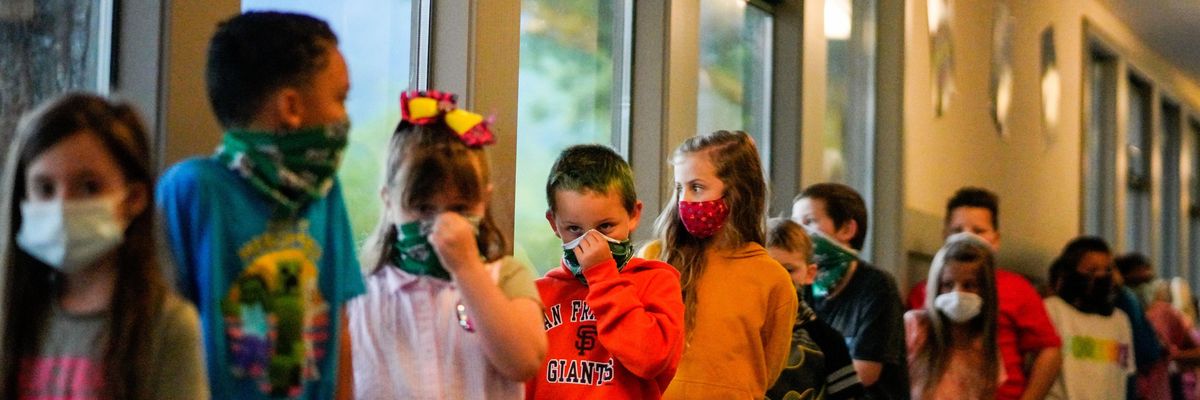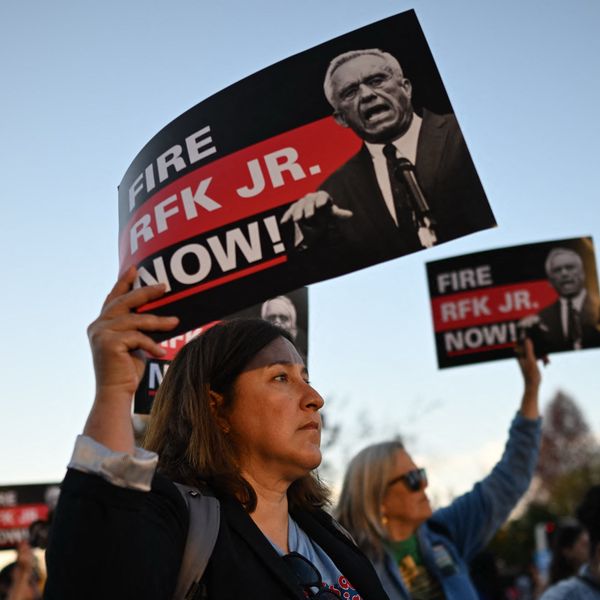As the Delta variant continues to spread and state and local officials enforce uneven safety measures in schools across the U.S., several states are reporting that children are accounting for more Covid-19 cases than ever--with both hospitalizations and
deaths on the rise.
The
Wisconsin Department of Health Services
reported Friday that residents under age 18 now account for more cases than any other age group, with 1,126 cases currently affecting children.
"The risk to children right now is higher than it's ever been during the pandemic because of the delta variant being more transmissible."
--Rachel Herlihy, Colorado state epidemiologist
In Oregon, public health officials
said children age nine and younger are now more likely to test positive for the
coronavirus than adults over age 60--a troubling new milestone for the pandemic in the state.
The states' rising cases are on track with a report that the American Academy of Pediatrics (AAP) and the Children's Hospital Association
released this week, which showed nearly one million children have tested positive for Covid-19 in the past month, following a return to in-person learning in school districts across the country.
"After declining in early summer, child cases have increased exponentially, with over 925,000 cases in the past four weeks," the report said.
Pediatric cases reported last week represented an increase of 480% over children's cases that were reported in mid-July,
according to Fortune.
Hospitalizations of children, while rare across the country, are also on the rise, with children now making up between 1.6% and 4.2% of Covid-19 hospitalizations in the 24 states that submitted data for the AAP report.
In Oregon, where around 75% of adults are at least partially vaccinated, officials
did not express major concerns about widespread severe illness in children. So far in the state, two children--both infants--have died of Covid-19 since the pandemic began 18 months ago.
In states with low vaccination rates, hospitals are
reporting that pediatric intensive care units have become overwhelmed in recent weeks.
In Louisiana, two children have
died of the disease in under a week, bringing the total number of fatalities among children to 16 in the state. Seven of those deaths have come in the last three months.
Dr. Mark Kline, physician-in-chief at Children's Hospital New Orleans, expressed outrage earlier this week at the rise in children's deaths.
"Children are being put at risk for serious illness and death by unvaccinated adults," said Kline. "Is there an acceptable pediatric body count? I think not."
Public health experts agree pediatric cases are most likely in areas where fewer eligible people are vaccinated. Currently, Covid-19 vaccines are available for most people over the age of 12. Louisiana has one of the lowest vaccination rates in the country, with
51% of residents 12 and over at least partially vaccinated.
"The best way to protect kids that can't be vaccinated is to have all the adults around them vaccinated," Dr. Eliza Hayes Bakken, a medical director at Doernbecher Children's Hospital,
told The Oregonian on Friday.
Other methods of protecting children--including adherence to the Centers for Disease Control and Prevention (CDC) guidance calling for universal masking in schools--is being applied unevenly.
As of September 14, nearly 60% of statewide cases in Georgia were in schools; Republican Gov. Brian Kemp has refused to mandate public health measures. Face coverings are also optional in schools in Colorado, where school cases nearly doubled over just seven days last week. In Denver schools, 220 schoolchildren were quarantined Wednesday after 35 staff members and 170 students tested positive.
"The risk to children right now is higher than it's ever been during the pandemic because of the delta variant being more transmissible," Rachel Herlihy, the state epidemiologist for Colorado, told Bloomberg.
Following Pfizer's announcement on Monday that preliminary data showed a "strong immune response" to its vaccine among five-to-11-year-olds, public health experts are optimistic that more children will be able to receive safe and effective vaccines in the coming months.
"People are working as hard as they can, as fast as they can to get this data out, and the
FDA has promised to review it as quickly as possible," Kawsar Talaat, a scientist at Johns Hopkins University and a principal investigator for Pfizer's pediatric vaccine clinical trial,
told Scientific American on Thursday. "So [the vaccine] will be here soon."
Approval could come as soon as late October or early November.
"Many of our team at the [Food and Drug Administration (FDA)] are parents and grandparents themselves, and our team shares the same concerns as many in our country about protecting our loved ones from Covid-19,"
said Janet Woodcock, acting FDA commissioner, and Peter Marks, the director of the agency's Center for Biologics Evaluation and Research, in a statement this week.
"Conducting clinical trials to determine an appropriate vaccine dose in children requires additional work over that done in the adult studies, including ensuring that the vaccine dosage and formulation strength used is the appropriate one from the perspective of safety and generating an immune response," they added.
Meanwhile, the AAP report this week
noted that while "it appears that severe illness due to Covid-19 is uncommon among children... there is an urgent need to collect more data on longer-term impacts of the pandemic on children, including ways the virus may harm the long-term physical health of infected children, as well as its emotional and mental health effects."


